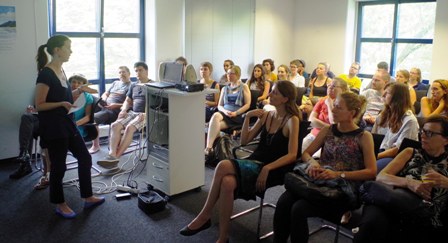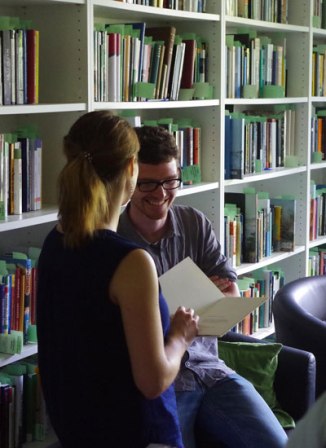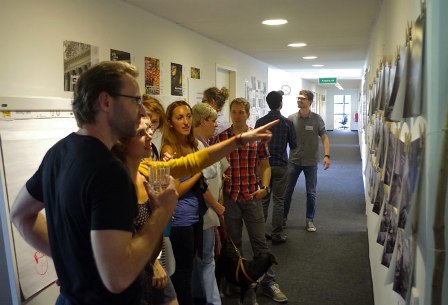2015 Final Projects
23.07.2015
Congratulations to the first cohort of students of the Environmental Studies Certificate Program. Fourteen ESP students from different disciplines successfully completed the program and presented their final projects on July 23 as part of an evening celebration at the Rachel Carson Center.

The audience in the packed conference room of the RCC clearly enjoyed the vitality, creativity and relevance of the final projects. Carson Fellows, doctoral candidates, RCC staff, as well as friends and family attended this inaugural event and what we hope to become an annual tradition. Befitting our transdisciplinary goal, we were also joined by members of local organizations dedicated to foodsharing (Münchner Tafel) and had at least one animal companion in the audience as well as several professional artists.
Thirteen students have now completed all requirements and will receive the Certificate in Environmental Studies (CES) supplemental to completing their Masters program in the summer semester 2015. We congratulate them:
- Mandana Bender, Art History
- Veit Braun, Sociology
- Pamela Flores Dávila, Biology
- Veronika Degmayr, Geography: Environmental Systems and Sustainability
- Adrian Franco, History
- Lukas Kolbeck, Sociology
- Sandra Mader, Anthropology
- Thomas Müller, Biology
- Ramona Mayr, Intercultural Communication
- Claudia Ricci, Business Management
- Carina Schmitz, Anthropology
- Julia Wiederer, American Studies
- Sibylle Zavala, Environmental Planning and Engineering
Two first-year students also completed their final projects ahead of schedule: Kathi Bochter and Stefanie Schlosser, both in the Education program.
The final projects resulted from many months of planning, research, and conversation among the group. Over the course of brainstorming discussions (at Osterseen June 2014, at Kochel January 2015), participants presented proposals and early versions of their final projects, which in turn were individually advised. At the heart of the ES final project is a set of research questions that engages with communities outside the university, draws from a range of expertise, and is then delivered in a format appropriate for a broad audience.

Students presented a variety of themes in environmental studies and delivered them in diverse forms including: a documentary film on invasive plant management in Berchtesgadener Land; an animated mapping of the life cycle of industrial ships; photographic exhibitions on foodsharing and intergenerational farm gardens; an illustrated children’s book on animals in the city; a set of flipbooks on the fluidity of “species” concepts; and papers on abandoned military sites that became nature reserves, corporate sustainability in the banking sector, and the environmental aesthetics of open air music festivals. These projects were undertaken with great curiosity and creativity — the spirit that we hoped to encourage when the program launched in 2013. The first class of Environmental Studies Certificate Program students has set an inspiring example. Kudos!


